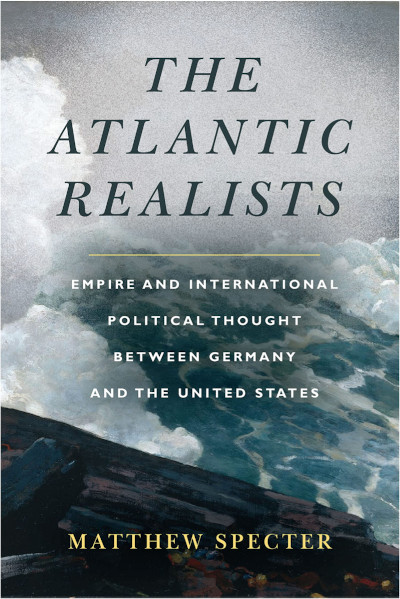In the picture
Cover of Matthew Specter's book 'The Atlantic Realists. Empire and International Thought Between Germany and the United States' (Stanford: Stanford University Press, 2022) 321 p.
The academic discussion on the realist theory of International Office finds here a peculiar approach. Although critical of this theory, as can be deduced from the little sympathy he has for its leading figures, Matthew Specter, professor of European intellectual history at Berkley, does not devote his book to refuting the realist postulates (basically, that the world is a power struggle, as opposed to the idealist theory that speaks of consensus and the possibility of multilateral agreements), but to downplaying the visionary pedigree of its main gurus, above all Hans Morgenthau.
The centrality of International Office in the political and social discussion during the second half of the 20th century put authors who conceptualized the Cold War confrontation on a certain pedestal. Some of these realists practiced politics, such as George Kennan or Henry Kissinger, although it could be said that the paradigmatic intellectual, due to his influence on the order of ideas, was Morgenthau, author of 'Politics among nations. The Struggle for Power and Peace' (1948).
Specter turns his attention to this and other contemporaries of profile and similar backgrounds, such as John Herz and Arnold Wolfers. Born or at least trained in Germany, they emigrated to the United States in the wake of the rise of Nazism. For this reason, their realist postulates have sometimes been seen as an attitude of wise caution in the face of the true nature of the sheep-turned-wolf. If they err on the side of pessimism, they can always be excused by the dramatic experience of the collapse of the Weimar liberal order and the suffering of the Holocaust.
Specter believes that the tradition of understanding the origin of what can be called "classical realism," consolidated in the 1940s and 1950s, explains much of the prestige it has enjoyed in the last seventy years. Its cachet lies in the fact that its promoters were refugees from Nazism and its realism, the bitter fruit of the disenchantment of interwar liberalism. However, for Specter, this interpretation has exalted a vision to which universal validity was attributed when in truth it was the product of a specific status . Moreover, according to agreement -and here is his second contribution and the main thesis of his book- Morgenthau and the other "émigrés" were merely bringing to the United States concepts matured somewhat earlier and influenced by the fathers of the "modern geopolitics" that emerged between the 1890s and 1910s -Friedrich Ratzel and Alfred Mahan, mainly- and by authors who served as a nexus such as Carl Schmitt and Karl Haushofer.
Specializing in the history of ideas, Specter's interest lies in tracing what he understands as a two-way intellectual community between Anglo-Saxon and Germanic geopolitical visions of mutual influence; hence the degree scroll and subtitle of his book: an "Atlantic realism" product of the exchange of "political thought between Germany and the United States".
The subtitle also includes the term 'empire', which alludes to the third precision that Specter wishes to make. Realism is sometimes presented as a synonym for 'Realpolitik', possibly because it contains the same word. reference letter But the author warns that 'Realpolitik' - an expression invented by the German Ludwig von Rochau in 1853 - refers to the balance between great powers (and this is how Bismarck applied it, to whom the term is related, even though he never used it), while realism does not speak of balancing, but of trying to assert the 'national interest'.
Specter concludes that the geopolitics born between the nineteenth and twentieth centuries does not look towards 'Realpolitik', but towards another term that was then more commonly used, 'Weltpolitik', centered on the global -imperial- aspirations of a Germany that sought its 'Lebensraum' (Ratzel) or 'Großraum' (Schmitt) and of a United States that applied the Roosevelt corollary to its Monroe Doctrine. Closing the circle of his reasoning, Specter considers that Morgenthau's realism, which in part drinks from the tradition that comes to him, exudes imperialism.
The book is more of an intellectual history, and of a few authors (each chapter is dedicated to some name of the 'classics' mentioned here) -in the line of other titles by Specter, such as his intellectual biography of Habermas-, than an academic treatise on theories of the International Office, a field into which it barely enters. It is interesting to know the origin and development of some ideas and how they enter and develop in the thought of certain authors. However, if the book is taken as an attempt to discredit Morgenthau or realism in general, it is really lame.

